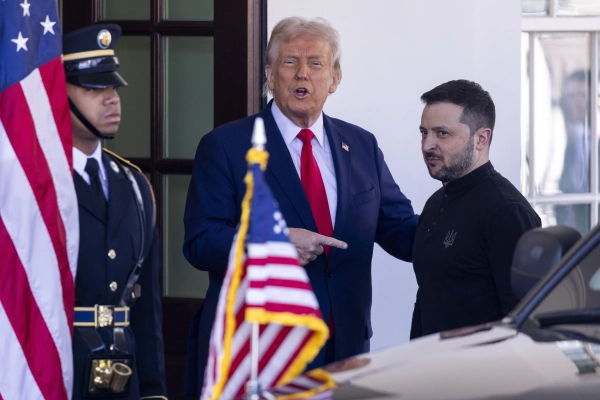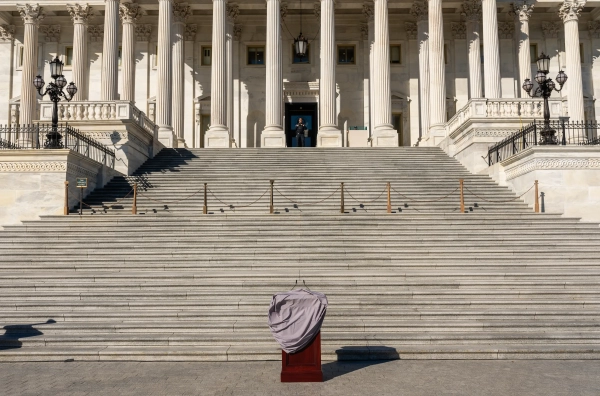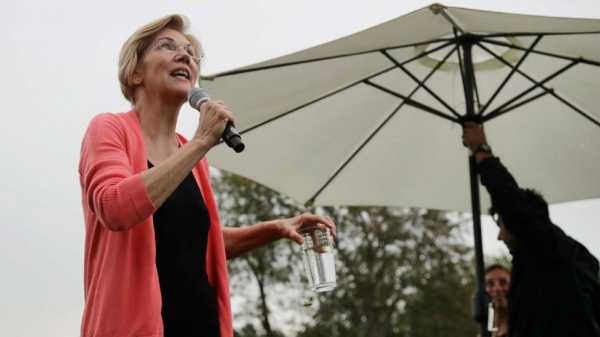
Castro said he supports cities and states that want to ban fracking and would move the country away from natural gas, but has not supported an immediate federal fracking ban.
Klobuchar and Biden went a step further to say they would review current permits to frack on public lands for environmental impacts.
“I see natural gas as a transitional fuel. It is better than oil but it’s not nearly as good as wind and solar, right? However, you have situations where you have dangerous fracking that shouldn’t be happening. So as president, in my first 100 days, I will review every fracking permit there is and decide which ones should be allowed to be continued and which ones are too dangerous. Then you go from there,” Klobuchar said.
Klobuchar specified that she would only support existing natural gas production if her administration could reverse the Trump administration’s rollback of a rule to limit methane leaks from transporting and storing natural gas.
“I think it will still exist for a while. And I think the key thing is as it exists as we make it more economic for renewable and wind and solar and the kind of technology that we are going to see and electric cars that we won’t immediately get rid of it. Process I just want — just being honest with people,” she said.
(MORE: Trump administration moves to roll back greenhouse gas rules on methane)
Expanding nuclear energy
Similar to questions about natural gas, some candidates expressed doubt in expanding nuclear energy as an option to replace fossil fuels citing concerns about how the country handles nuclear waste.
“I would look at those plants and make sure they’re safe and figure out what upgrades we have to make to the plants,” Klobuchar said.
“But I wouldn’t expand nuclear unless we can find safe storage and figure this out.”
(MORE: What we know — and don’t — about the mysterious Russian nuclear-propelled missile explosion)
Sanders said he thinks wind, solar, and geo-thermal energy are more cost effective and present less risk than building new nuclear power facilities.
“We got a heck of a lot of nuclear waste which, as you know, is going to stay around this planet for many, many, many thousands of years. And you know what? we don’t know how to get rid of it right now. It doesn’t make a whole lot of sense to me to add more dangerous waste to this country and to the world when we don’t know how to get rid of what we have right now,” he said.
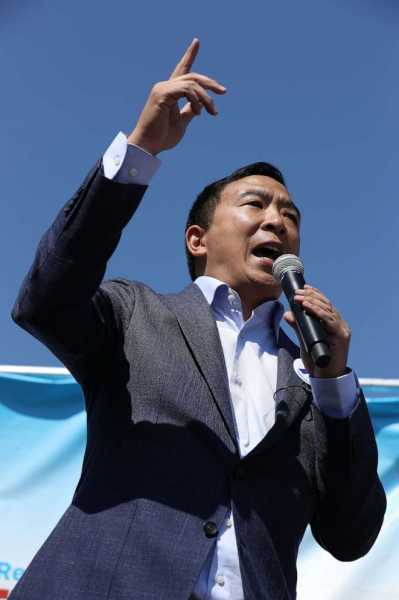
Chip Somodevilla/Getty Images
Democratic presidential candidate Andrew Yang delivers a 20-minute campaign speech at the Des Moines Register Political Soapbox at the Iowa State Fair, August 09, 2019, in Des Moines, Iowa.
But Andrew Yang, for one, supported nuclear energy saying new technologies have made it safer and produce less waste than the reactors in the U.S. now.
“It’s much, much safer to dispose of. It produces much more energy. So we need to upgrade to thorium fueled reactors. And to me, trying to get rid of all the nuclear power plants that produce 20% of the nation’s energy is not going to help us accomplish our goals,” he said.
Americans will have to make personal sacrifices
Candidates said their different plans to address climate change would require Americans to make some adjustments in their day to day lives, either through personal choices like energy consumption, limiting plastic use, and dietary changes or in larger systemic changes like moving away from large-scale agriculture.
A few candidates acknowledged that their plans could mean some tension or costs for Americans as they encourage more people to switch to electric vehicles and shift major industries like agriculture.
“There’s going to be change and we’re going to have to ask people to understand that we have got to make those changes now even though they may be a little bit uncomfortable for the sake of future generations,” Sanders said of some of the changes, adding that his plan would have programs to support smaller family farms.
Sanders also said some of the costs of his plan will be passed on to the fossil fuel industries and wealthiest Americans, though he added his plan includes support for employees of fossil fuel companies for salary and training if they lose their jobs.
(MORE: EPA finalizes power plant rules to replace Obama’s signature climate change policy)

Meg Kinnard/AP
Democratic presidential contender Bernie Sanders addresses a Medicare for All town hall campaign event, Aug. 30, 2019, in Florence, S.C.
“It will end up on some taxpayers’ shoulders if you’re in the fossil fuel industry, you’re gonna be paying more in taxes, that’s for sure. I happen to believe, in general, that at a time when we have massive levels of income and wealth inequality, where the richest three people in this country own more wealth than the bottom half of the society, where major profitable corporations like Amazon who made over $10 billion in profits didn’t pay a nickel in taxes. Am I gonna guarantee Jeff Bezos won’t be paying more in taxes? I won’t,” he said.
But Sen. Elizabeth Warren argued that the focus on individual choices takes the focus away from the fossil fuel industry she says is responsible for the consequences of climate change.

Elise Amendola/AP
Democratic presidential candidate Sen. Elizabeth Warren, D-Mass., looks up at the rain as an umbrella is set up during a campaign event, Monday, Sept. 2, 2019, in Hampton Falls, N.H.
“There are a lot of ways that we try to change our energy consumption and our pollution and god bless all of those ways. Some of it is with lightbulbs, some of it is on straws, some of it is on cheeseburgers, right? There are a lot of different pieces to this. And people are trying to find the part that they can work on and what can they do. And I’m in favor of that. And I’m going to help and support,” she said.
“But understand this is partly what the fossil fuel industry hopes we’re all talking about. That’s what they want us to talk about. This is your problem, they want to be able to stir up a lot of controversy around your lightbulbs, straws, and cheeseburgers,” she said, adding “It’s corruption. It’s these giant corporations that keep hiring the PR firms that, gets it all out there, so we don’t look at who is still making the big bucks off polluting our Earth.”
Changes to federal disaster assistance money
As Hurricane Dorian is still top of the mind for many people in the country, several candidates discussed changes they would make to how the federal government distributes disaster assistance.
Castro said he wants communities to invest in becoming more resilient to that kind of flooding and that his plan would strengthen the National Flood Insurance Program to help people afford flood insurance and protect their property.
“My plan calls for investing in national disaster resilience investment and also, very importantly, in pre-disaster mitigation. We don’t want to wait until there’s a natural disaster to actually make our communities more sustainable. I would invest in that,” Castro said.
Yang supports actively giving people money to help relocate themselves to higher ground, arguing that poorer communities have less ability to move themselves out of harm’s way during disasters.
“We need to get our people to higher grounds. You’re not on your own. We need to start making our communities more resilient and protect ourselves. You all know—If you’ve heard anything about me and the campaign what’s my flag ship proposal? Freedom dividend, everyone gets $1,000 a month—$12,000 a year, that would help citizens of this country protect themselves in a natural disaster,” he said.
(MORE: FEMA staffing stretched thin as Atlantic storm season intensifies)
Sanders said he supports changes to federal disaster assistance that would encourage people or cities to move away from properties that are catastrophically damaged by flooding. He said it doesn’t make a lot of sense to rebuild homes that will just be destroyed again in the next storm.
“We have the absurd situation where FEMA will only pay to repair a facility or a piece of infrastructure where it was before it was destroyed. That’s pretty stupid. If it was destroyed once and you rebuild it, it’s destroyed twice, it doesn’t make sense to put it there again. The answer is, absolutely, which raises the broader question of how we’re going to protect communities,” Sanders said.
How candidates would deal with Washington politics
One of the persistent questions to Democratic candidates is how to implement their climate change plans if they meet opposition in the Senate or how they would ensure their climate policies couldn’t be reversed by a future Republican president.
Some candidates have said they support eliminating the filibuster to overcome possible Congressional opposition to pass a Green New Deal.
“If they fail to act, as president of the United States, I am prepared to get rid of the filibuster to pass a Green New Deal,” Harris said.
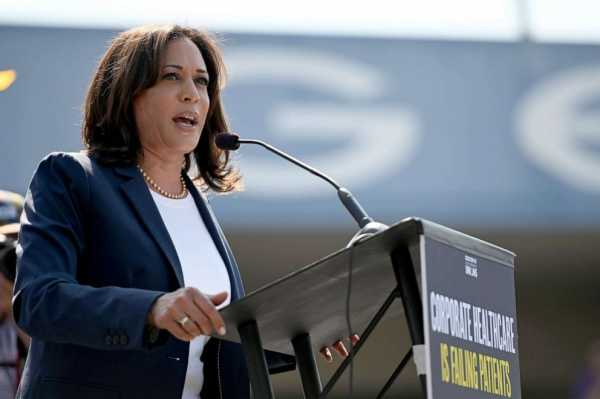
Robyn Beck/AFP/Getty Images
Democratic presidential hopeful Senator Kamala Harris speaks at a Labor Day rally for healthcare workers and supporters, Sept. 2, 2019, in Los Angeles.
Sanders said he supports reforming the filibuster but not eliminating it, adding that he could overcome opposition by pursuing some of his plans through the Congressional budget process.
(MORE: A look at memorable filibusters in the Senate)
“If your question is — are we going to need 60 votes to save the planet? The answer is, no, we are not. There are ways to get that through the budget reconciliation act which will require 51 votes and that’s the method we will use,” he said.
When asked about a carbon tax Biden emphasized that policies would have to bring different groups of people to the table.
“The bottom line of this is, what we have to do is understand that you need to be able to bring people and countries and interests together to get anything done. You can have—plans are great, but executing on those plans is very different. We make up, it’s the existential threat of not this generation but the whole world, the existential threat that exists if we don’t move on it, number one,” he said.
Gov. Jay Inslee, youth climate groups made their mark on debate
Multiple candidates acknowledged Gov. Jay Inslee’s contributions to the campaign saying that even after he dropped out of the race his vocal support for climate change as an issue brought it to the forefront of the debate.
Sen. Elizabeth Warren even released a climate plan specifically referencing some of Inslee’s platform in the day before the town hall.
(MORE: Candidates name check Inslee at climate town hall and praise his ‘open source’ ideas )
One of the groups that has campaigned the Democratic National Committee for an official climate debate, the youth-focused Sunrise Movement, also had several members in the audience at the CNN event asking questions of the candidates.
“I also want to give a shoutout to governor Jay Inslee who did a fantastic job of bringing this issue to the forefront of this campaign as well as to folks like the league of conservation voters and the sunrise movement that have been pushing for those of us who are running for president to address this as we should,” Castro said in his first remarks early in the night.
Castro and several other candidates mentioned their concern about how the changing climate would impact their children or future generations, a point that youth-focused climate groups like Sunrise emphasize as part of their platform.
“There’s something about the moral authority of young people. Looking in the eyes of those in charge and saying what are you doing to protect us? On issues from guns to climate is part of why we’re finally going to see change. So we have to embrace the actions that make it possible for the political conversation to be shaken up the way it needs to be,” South Bend Mayor Pete Buttegig said.
Even without Inslee’s climate-centric campaign in the race climate activists considered the focus on the issue a success and said they will continue to support progressive candidates with ambitious plans on the issue.
Sourse: abcnews.go.com
